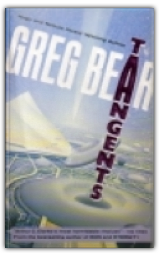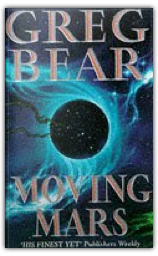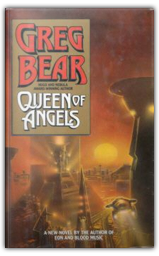 Queen of Angels
Greg Bear
Queen of Angels
Greg Bear
Eon and Eternity may have sold more copies, but Queen of Angels is Greg Bear's masterpiece; a novel of extraordinary richness and depth. The depth isn't immediately evident; the showy, well handled murder plotline keeps you reading, the many futuristic and mind-tickling ideas keep popping up to make you think, and the vaguely experimental division of the text between different viewpoints can be a little distracting. But at the core of this book is an exploration of the nature of consciousness as profound as any in literature. Martin Burke is a psychologist who investigates the motivations for a murder in a society, using nanotechnology to explore the Country of the Mind. AXIS is a sophisticated computer that has travelled to a distant planet. The two journeys of exploration are paralleled, but in their different ways they prove relative dead-ends. Bear's masterstroke is surreptitiously to delineate the shift of another sophisticated computer, JILL, from a linear intelligence based on processing data to a self-aware sentient intelligence that is a genuine consciousness. These passages at the novel's conclusion are amongst the most affecting things Bear has written.  The Venging
Greg Bear
The Venging
Greg Bear
Set in 13th century Russia, this book follows the exploits of the Teutonic Knights of Germany. After the failure of their most recent campaigns, the Knights are looking for plunder and land and, turning their sights on Russia, they employ the witch Baba Yaga to sow dissent among the Russian states. 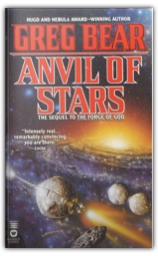 Anvil of Stars
Greg Bear
Anvil of Stars
Greg Bear
Eighty-two mortal exiles ride through space in the Ship of the Law, a ship constructed from the fragments of Earth's corpse, determined to punish those responsible for their planet's destruction. Reprint. 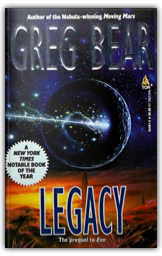 Legacy
Greg Bear
Legacy
Greg Bear
The Way is a tunnel through space and time. The entrance is through the hollow asteroid Thistledown and the space station Axis City that sits at the asteroid's center. From there the Flawships ride the center of the Way, traveling to other worlds and times.  Slant
Greg Bear
Slant
Greg Bear
This is the sequel to Greg Bear's popular Queen of Angels, and, like most of this award-winning author's works, it's a stunner. Bear is right at home with the computer and nano technologies that underlie his near-future society. With most of the world's ills having been cured by nanotech, humanity is free to turn its explorations inward, to the mind. Advanced therapies have all but eliminated emotional imbalance, and things have never been better. But when public defender Mary Cho begins investigating a double-murder, she uncovers the truth: all of the high tech is failing, and things will never be worse. 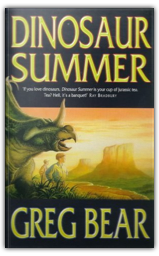 Dinosaur Summer
Greg Bear
Dinosaur Summer
Greg Bear
Remember Sir Arthur Conan Doyle's The Lost World, in which an expedition led by Professor George Edward Challenger discovered an Amazonian plateau where dinosaurs still roamed? In Dinosaur Summer, Greg Bear assumes that Challenger's expedition really took place, and that for nearly 50 years dinosaurs have been relatively commonplace in zoos and circuses throughout the world. But the beasts are not easily kept in captivity, and slowly but surely their numbers are dwindling. Now there is only one dinosaur circus left, and it's shutting down. The dinosaur trainer wants to return his animals to the wild, so an expedition is organised to return the dinos to their nearly inaccessible plateau. Accompanying the group (which includes special effects master Ray Harryhausen) is 15-year-old Peter Belzoni, the son of the National Geographic photographer covering the story. The boy is about to have the adventure of a lifetime.  Darwin's Radio
Greg Bear
Darwin's Radio
Greg Bear
Greg Bear notoriously reworks traditional SF themes in his own special way. His first success, Blood Music (1985), features an intelligent plague which seems destructive but eventually recreates humanity in new, transcendent form—echoing Arthur C. Clarke's rough-hewn 1953 classic Childhood's End. Darwin's Radio revisits this territory but foregrounds scientific, medical and political reactions to disaster; it's reminiscent of a Michael Crichton technothriller. The menace is a "new" virus, SHEVA, which is in fact very old—embedded in a ancient human DNA sequences and now emerging as "Herod's 'Flu", which in pregnant women always forces miscarriage. Chillingly, US health aauthorities first see this threat as something to boost funding, while conservative scientists suppress research into the bizarre reality of what's happening. Evidence from Neanderthal remains and Stalin's mass graves hints that SHEVA is no disease but evolution in action. Human genomes everywhere, linked by the subtle network of "Darwin's radio", are activating Plan B: the creation of a new species. Then, with the world racked by panic, riots, death cults and martial law, SHEVA begins to mutate ... Tense stuff, though some biological info-dumps are tough going, and it's awkwardly paced towards the end when nine months are needed for the biologist heroine's own pregnancy, leading to... but that would be telling. This is a fearfully plausible scientific thriller. —David L Langford |
 Made with Delicious Library
Made with Delicious Library
London, State zipflap congrotus delicious library Scott, Mike
